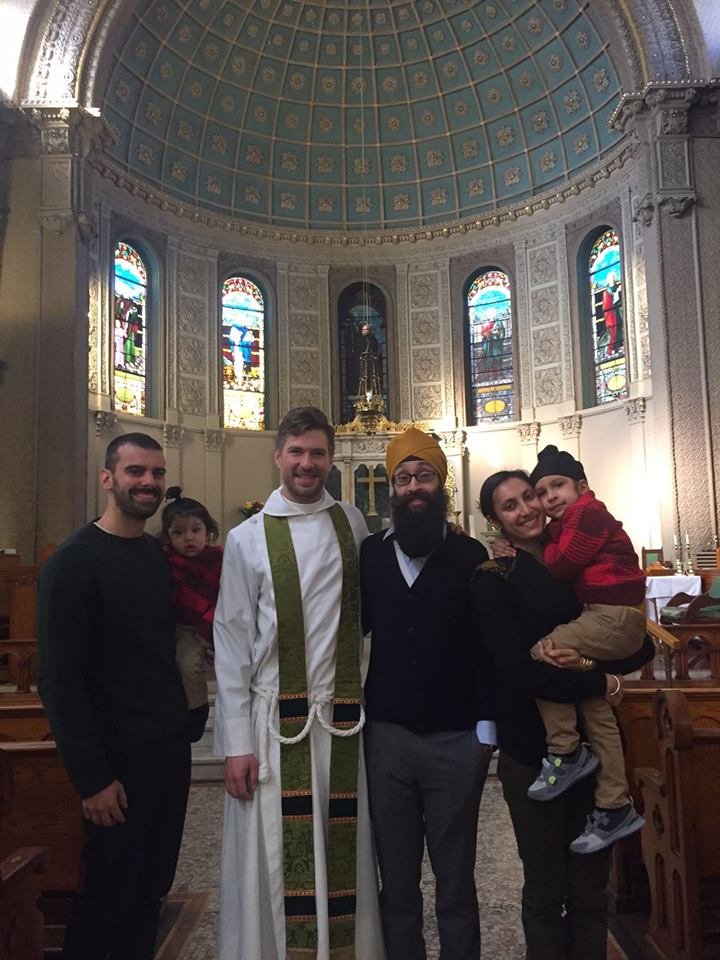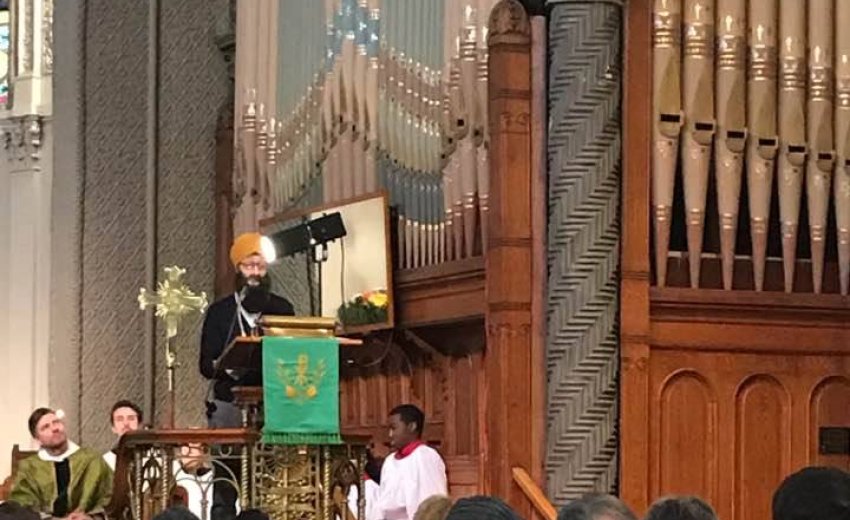Dr. Prabhjot Singh preached the following sermon at the All Saints' Church observance of Dr. Martin Luther King, Jr. Day on January 15, 2017. Dr. Singh is Director of the Arnhold Institute for Global Health and Chair of Health System Design & Global Health at the Mount Sinai Health System, as well as Special Advisor for Strategy and Design at the Peterson Center for Healthcare. He is author of Dying and Living in the Neighborhood: A Street-Level View of America's Healthcare Promise.
Let me begin by sharing my gratitude for the warm embrace your congregation has shown to my family, to your brothers and sisters who practice the Sikh faith, and most importantly, to your commitment to our shared humanity. Thank you Reverend for your friendship and invitation.
Today we stand together as people who seek moral clarity, disciplined courage, and practical action to forge the right path through the challenging days ahead.
Yesterday, my 4-year old son Hukam Singh and I listened to Reverend Martin Luther King Jr’s 1967 speech on the three evils of society: of corrosive racism, of mindless economic exploitation, of unending and reckless war. His voice was urgent and confident, a lantern to carry within us as dusk in America draws near. I wanted my son to join me, so he could hear what a resolute and unwavering mind sounded like, to know a voice without fear.
Indeed, this week is a momentous one.
Tomorrow, I will join millions across the nation in honoring the moral clarity revealed to us by Reverend Martin Luther King Jr’s words and actions. By Friday, our nation will inaugurate a president who spent yesterday denigrating civil rights leader and Congressman, John Lewis, who was one of the first Freedom Riders assaulted upon entering a white-only waiting room in South Carolina, who was nearly left for dead by the Klu Klux Klan in Alabama.
As my mind struggled to put all of this together, King’s words from his 1967 speech came hurtling into the present and landed in my mind with calm confidence: “the collision course is set.”
Today, I want to reflect with you upon the mindset that could gracefully endure this collision, and ensure that through it, the moral arc of the universe bends ever more surely towards justice. I will do this in three parts…
The first is about on the work of mending an anxious and fearful mind.
An anxious and fearful mind is a wandering mind, hoping to escape or find a clever way out of its predicament.
I know this first hand.
In 2013, I was a professor of international affairs, with big ideas about health and economics. In October of 2013, in my neighborhood close to my home, I was attacked by 20-30 young men, who called me terrorist and fractured my jaw. The next day, after I had jaw surgery, I felt lost and did not know what to do. My mind was clouded with too many thoughts, and I felt trapped and paralyzed.
It was the third time since 9-11 I was physically assaulted in New York City, and the fifth time since my family came to this country. And since I had been an advocate for others who had experienced hate crimes in the past, I knew that hundreds of others go unanswered. As media requests poured in, I knew in my heart that I had to say something, and that the collision course between our family’s private lives and public hostility was set.
However, experience showed me that my own mind, roiling with ego and anger, would not think of anything useful alone. Instead, I sat with my family and tried to place my mind in the hands of Waheguru — the Sikh word for the divine force that connects all things — and asked for peace of mind so I could find surer footing for the work ahead.
As I read today’s bible readings, I saw in Psalm 40, the same message that I found in a Sikh shabad that my wife and I sang to find a way forward. I will read the Psalm first, and then the Sikh Shabad.
Psalm 40
He lifted me out of the desolate pit, out of the mire and clay;
he set my feet upon a high cliff and made my footing sure.
He put a new song in my mouth,
a song of praise to our God; *
many shall see, and stand in awe,
and put their trust in the Lord.
[not read: ūthat sukhīā baithat sukhīā.
bhau nahī lāgai jānh aisē bujhīā
rākhā ēk hamārā suāmī .
sagal ghatā kā antarajāmī .1. rahāu .]
Standing up, I am at peace; sitting down, I am at peace.
I feel no fear, because this is what I understand. ||1||
The One Lord, my Lord and Master, is my Protector.
He is the Inner-knower, the Searcher of Hearts. ||1||Pause||
Through remembering the divine, my mind felt steadier. And in that steadiness, I was able to see something that surprised me. That my most deeply felt emotion, and the one that I was most compelled to share, was of gratitude. Gratitude that my wife and son were not with me, gratitude that bystanders intervened, gratitude that I would be able to share my views on restorative justice, gratitude that I was not imprisoned by hate, gratitude for the groundswell of support.
And this brings me to the second part. As a mind is made steadier by meditating upon our shared divinity, we are shown the power of compassion.
As I shared my gratitude on national media, people like yourselves reached out to my family and the Sikh community with extraordinary compassion. I saw firsthand the strange and beautiful ways that we are connected: My family received prayer cards from a church in Mississippi, letters from a Hindu temple in southern California, an invitations to meet your congregation. Support to organizations that amplified this simple message surged.
However, the most powerful response came from my neighbors. Grandmothers hugged me in the streets, shopkeepers shared their sympathies, and my patients in the nearby hospital stopped to ask me how I was feeling even as I wheeled them into the intensive care unit. People learned about the community healthcare organization that my wife had been building in the neighborhood, and found different ways to show their support. I felt that my family was *safer* in my neighborhood as a result, not less so.
Now, there are the realists and cynics who will say, this is all nice, but how does this change anything? Isn’t this just feel good talk after a tragedy? Who will be punished, and how? They will say, you must speak truth to power and confront the forces of hate. Anything less is a form of feel-good therapy; safe spaces in a world of privilege.
I know people say this because I heard all of this. I’m reminded of the philosopher Wittgenstein, who said, “of that which we cannot speak, we must pass over in silence.” They did not see the networks of power that were being formed and forged in the name of compassion. They did not see how a simple expression of compassion served as an invitation to act without instruction. They did not see a community getting ready to be ready. Because it takes hard work to act in ways that truly matter.
They also did not see the alternative. A world where I attacked my neighborhood, where I screamed with hate against the hate that I saw. A world where the forces of divisiveness prevail, and narrow interests give way to a war of all, against all. We do not need to wait to see if this is, indeed, true. This is what a steady and compassionate mindset affords us to know.
And yet we must act. Which leads me to the third part.
And now I read from Isaiah, followed by a Sikh activist who was assassinated for uncovering human rights violations.
Isaiah 49:1-7
He made my mouth like a sharp sword,
in the shadow of his hand he hid me;
he made me a polished arrow,
in his quiver he hid me away.
‘I challenge the Darkness. If nothing else, then at least around myself, I will not let it settle. Around myself I will establish Light.’” - Jaswant Singh Khalra
As I read both of these passages, I try to do so with a steady and compassionate mind. In doing so, I know that we must not act against narrow interests, which only serves to enlarge them. Instead, we must act for justice, which serves to repair the breaches between us, and build a house for all of humanity to live in. And each of us is a polished arrow, waiting to be loosed in service of a greater aim.
What I experienced in 2013 changed me. I saw that I could not sit in repose, analyzing the world around me as an academic. Instead, I saw, and still see my role as a physician-advocate for a healthy society, and foremost, as a neighbor. For me, it meant that I had to shift my work closer to my local community, and work in more practical ways to improve the health of those across the nation and world. Today, there is no shortage of this work, and as we hurtle towards Friday’s inauguration, the health of everyone at risk.
It is always harder to build a house than it is to tear it down.
Each of you has been polished by your personal experience or professional skill to act in a different way. Your aims will be different as you work on a different part of the house that we must build. For me, it is in safeguarding the health of those who need it most. For you, it may be to teach our children, advocate for vulnerable immigrants, to defend our civil liberties or to state clearly that this house cannot be built without women standing shoulder to shoulder with any man.
If we allow the noise, fear and anxiety to drown us, we will be paralyzed by inaction. The house of justice will crumble in plain view. If we ask for divine guidance to steady our mind, open ourselves to the organizing power of compassion, and aim to act for justice where and when we can, we will not only survive the collision course that is set, but bend the moral arc of the universe towards justice.
Tomorrow, we should be prepared to have King’s powerful words act upon us, preparing us to act in turn:
“cowardice asks the questions, is it safe; expediency asks the question, is it politic; vanity asks the question, is it popular, but conscious asks the question, is it right. And on some positions, it is necessary for the moral individual to take a stand that is neither safe, nor politic nor popular; but he must do it because it is right.”
I hope that god grants us all the steadiness of mind, the compassion of heart, and the strength of action to do what is right in the days to come.
Amen.

